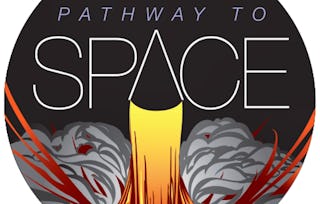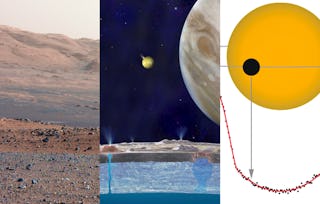How are astronomers approaching their search for life in the universe? What have we learned from the surge of exoplanets discoveries? How likely is it that Earth does not host the only life in the Universe? In this course we explore the field of astrobiology, an emerging multidisciplinary field. Progress in astrobiology is driven by telescopes on the ground and in space, and by new insights on how life emerged on Earth and its diversity. The topics in this course range from the science of how exoplanets are detected, to the chemistry that supports the argument that the ingredients for life are common in the Universe.

Astrobiology: Exploring Other Worlds

522 reviews
Skills you'll gain
Details to know

Add to your LinkedIn profile
See how employees at top companies are mastering in-demand skills

There are 6 modules in this course
Students will learn about planet formation by examining our own solar system and how these basic principles apply to exoplanets (planets around other stars).
What's included
9 videos1 reading7 assignments
Students will learn about how astronomers look for planets around other stars, why it is so difficult to find them, and what we can learn about the properties of planets from each detection method.
What's included
7 videos6 assignments1 peer review
Students will learn about the features of stars and exoplanets that might promote the development of life outside of Earth.
What's included
7 videos6 assignments1 peer review
Students will learn about the biological history of Earth, how life can develop and thrive in extreme conditions, and where else in the universe life might exist.
What's included
8 videos7 assignments
Students will learn about the development of complex organisms on Earth and the biological processes that led to species evolving intelligence.
What's included
7 videos6 assignments1 peer review
Students will learn about the possibilities of finding intelligence species on other planets, and the challenges of interplanetary and interspecies communication and exploration.
What's included
9 videos14 assignments1 peer review
Instructor

Offered by
Explore more from Physics and Astronomy
 Status: Preview
Status: PreviewThe University of Edinburgh
 Status: Preview
Status: PreviewUniversity of Geneva
 Status: Free Trial
Status: Free TrialUniversity of Colorado Boulder
 Status: Preview
Status: Preview
Why people choose Coursera for their career

Felipe M.

Jennifer J.

Larry W.

Chaitanya A.
Learner reviews
- 5 stars
92.14%
- 4 stars
5.93%
- 3 stars
0.57%
- 2 stars
0.19%
- 1 star
1.14%
Showing 3 of 522
Reviewed on May 3, 2021
Excellent course Chris Impey is a wonderful engaging tutor. Have completed both his courses offered through University of Arizona and am currently reading his first book. First class!!!
Reviewed on Feb 15, 2021
This course has been an amazing experience. Although I would have loved to have classes just to get to know everyone and the professor, it was an insightful course that I would do all over again!
Reviewed on Sep 18, 2020
Nice course. Glad I enrolled and completed. For those who are interested in aliens and exoplanets beyond stories and movies, the course is highly recommended.

Open new doors with Coursera Plus
Unlimited access to 10,000+ world-class courses, hands-on projects, and job-ready certificate programs - all included in your subscription
Advance your career with an online degree
Earn a degree from world-class universities - 100% online
Join over 3,400 global companies that choose Coursera for Business
Upskill your employees to excel in the digital economy
Frequently asked questions
To access the course materials, assignments and to earn a Certificate, you will need to purchase the Certificate experience when you enroll in a course. You can try a Free Trial instead, or apply for Financial Aid. The course may offer 'Full Course, No Certificate' instead. This option lets you see all course materials, submit required assessments, and get a final grade. This also means that you will not be able to purchase a Certificate experience.
When you purchase a Certificate you get access to all course materials, including graded assignments. Upon completing the course, your electronic Certificate will be added to your Accomplishments page - from there, you can print your Certificate or add it to your LinkedIn profile.
Yes. In select learning programs, you can apply for financial aid or a scholarship if you can’t afford the enrollment fee. If fin aid or scholarship is available for your learning program selection, you’ll find a link to apply on the description page.
More questions
Financial aid available,
¹ Some assignments in this course are AI-graded. For these assignments, your data will be used in accordance with Coursera's Privacy Notice.

